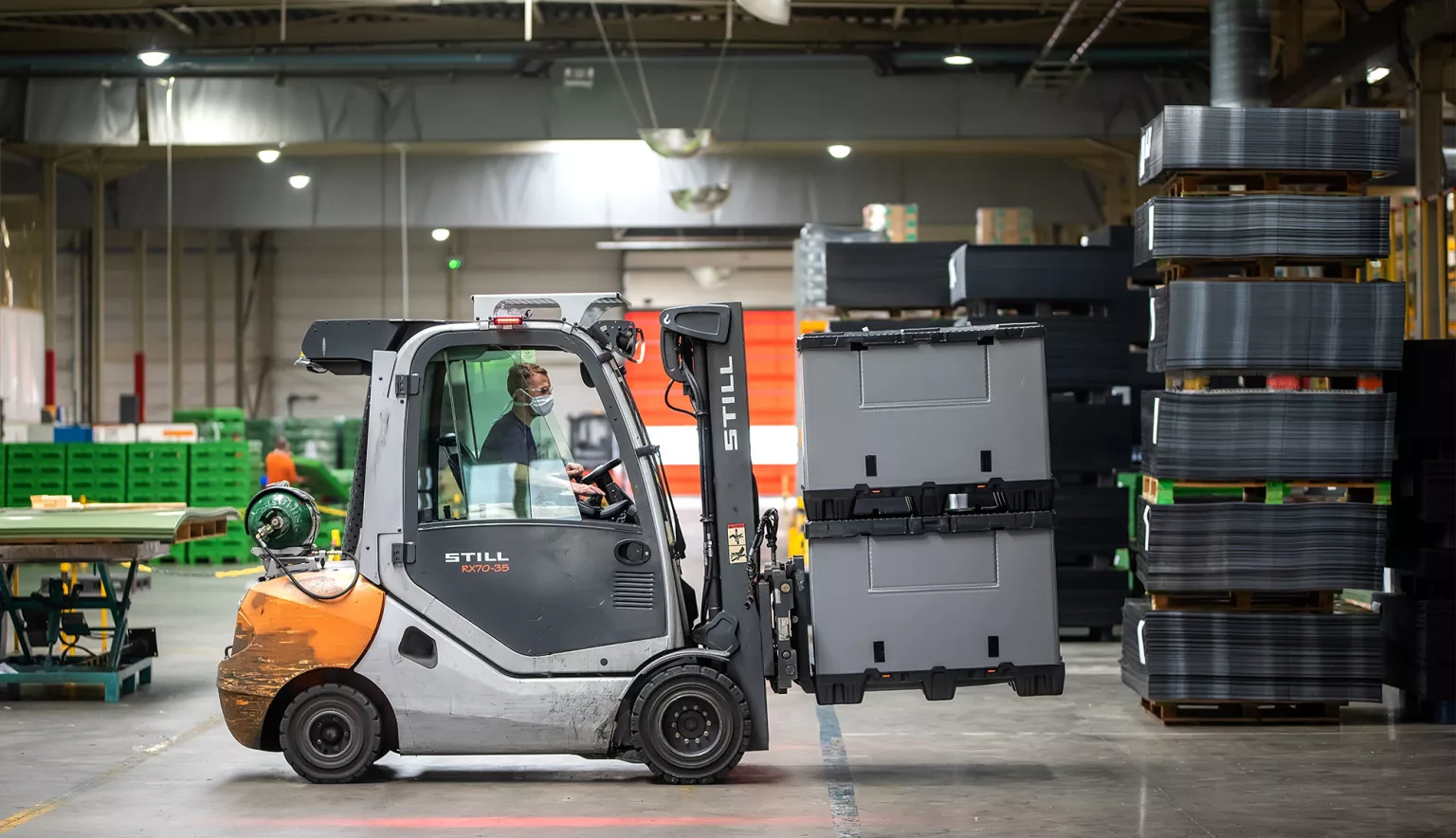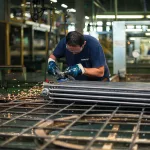Corplex is committed to reducing waste and driving industry-wide change with its closed loop concepts and circular solutions.
CLOSING THE LOOP
What excites me most about working here is that we can really change the approach to plastics,” proclaims Lucas van der Schalk, CEO of Corplex, a company specialising in circular plastics solutions.
Over the past few years, there has been a revolt against plastic – in 2016 a Greenpeace petition to ban plastic microbeads in the UK (used in face scrubs) hit 365,000 signatures in only four months. The media is saturated with images of plastic waste piled up in landfill sites and in the stomachs of sea creatures. An article by The Guardian calls it ‘the most visible product of our past half-century of rampant consumption’ – in other words, a tangible symptom of a wider problem.
You might think that a CEO of a plastics company would want to sweep such problems under the rug. But van der Schalk is eager to engage people on these issues, and he and his company are being proactive in implementing real changes to the industry.
“Fundamentally, the worst thing about plastics is that we often use them once and throw them away – it’s anathema to me and it doesn’t sit right with the business, so we are trying to do something about it,” he tells me.
REDUCE, REUSE, RECYCLE
“We talk about the three Rs: Reduce, Reuse and Recycle, so recycle is the last step. First you just want to reduce the amount you’re using, and then you want to try and reuse it,” the CEO continues.
“For us, waste is the single most important element we focus on, not just in our own operations but those of our customers. The more waste we can eliminate, the better it is.”
Van der Schalk entered the packaging industry via a background in the automotive sector; car assembly requires many different components, which in turn necessitates many different types of packaging. He was initially struck by the operational immaturity of the packaging industry compared to its automotive counterpart.
“Plastics in the automotive industry are much more technical, with much higher demands placed upon them,” he says.
“For me, taking the operational experience from automotives and bringing that into plastics for packaging has meant that we’ve been able to up the quality standards and demands we put upon ourselves, and are actually in the process of changing the paradigm within the industry to make it more professional, scientific and consistent in its quality.”
With factories in Europe and USA, Corplex creates circular plastics solutions. It makes plastics and packaging products, including polycarbonate product such as skylights, stadium roofing, packaging for the automotive, retail and pharmaceutical industries, and products for the construction and graphics industry. Its production is underpinned by sustainable principles – it wants to abandon the traditional linear supply chain model in favour of more durable products that can be returned, recycled and repurposed at the end of their useful lives.
“The simplest way of putting it is that very little waste leaves our sites. All of our sites are self-contained insofar as they produce the products, convert it into whatever is needed, and the final product will then be shipped to the customer or they will come and pick it up,” the CEO tells me.
While it endeavours to create products with zero waste, this isn’t always possible. For example, its extrusion lines are two metres wide, but sometimes it might have a customer who would like a 1.8 metre product. This extra 20 centimetres of plastic is either fed directly back into the machine or into one of the onsite re-grinding or re-pelletising machines. It also works with a lot of post-industrial material, such as waste from the production of crisp packets.
“We will work with a third-party supplier – in this case Biffa – and they will take this post-industrial material, make it into pellets and we will use that as well. That means we can divert some material from landfill,” van der Schalk says.
Corplex also works with customers, helping take some of their waste back. It is currently working with a popular supermarket chain to take their plastic waste and make new packaging for them from it. It also provided the plastic signage for the 2012 London Olympics, which it collected and recycled into new products once the event was over.
Van der Schalk believes that Corplex’s ‘global but local’ approach distinguishes it from competitors while minimising its carbon footprint. The company has nine facilities, in Slovakia, Spain, the UK, the US and five in France.
“We have global principles and global specifications that we apply to all these sites and then we have best practices that we apply to local areas,” the CEO explains. “Anything we ship in the UK can always come back to our factory in the UK and we can reuse it.
“Then, because we have a group of disparate customers with smaller projects, we can develop pilot projects with them, which we can then show to other potential clients. We can show them that this way of doing something works and saves money. That gets them on board and gives us even more pilot projects.”
CUBES AND LOOPS
In short, Corplex is aiming to “close the loop”, a term which in the plastics industry refers to the process of recycling and using products without material loss, reducing waste and using fewer raw materials. The three main stages of the loop system consist of manufacture of the product, re-using the product for a prolonged period and at the end of life recycling the material to make a new version of the product and the cycle starts all over again.
Corplex works with its customers to create closed loop systems.
“The loop is an investment, so customers are always happy spending some time planning it,” van der Schalk.
When created and implemented correctly, closed loop systems will allow companies to save money while reducing their carbon footprint.
“We get a container and develop it in a such a way that we use as much of the air inside it as possible, which is called ‘cubing it out’. That container then goes into the truck which is also ‘cubed out’, so there is a minimum amount of air being shipped to the customer. The customer takes the product and unpacks it. When the container is empty it collapses, and you can put as many as four collapsed containers in the space where one container was.
“This means that only one in four trucks have to return to the supplier. On average we save around 300 tonnes of CO2 per product per year. Think how many thousands of products go into the car; it’s hundreds of thousands of CO2 being saved per car,” the CEO explains.
The concept of ‘cubing out’ (also referred to as ‘cube optimisation’) refers to efficiently optimising the amount of space used to ship and store products. Surprisingly, it is not common practice in the delivery industry, which van der Schalk explains has prioritised optimising customer experience over storage and packing.
“When you order something online, someone will deliver it and you will see inside the van that it’s half empty, with loads of cardboard boxes thrown in. The box is the wrong size and there’s a box in that box, which gets thrown away,” he adds.
“Our boxes and totes are stackable, so you can put a number of different shaped products inside and they will stack one on top of each other. Then when you put them in the vans, they are suddenly cubed out, and you only need to have two vans delivering instead of six. For larger trucks we have have developed a sleeve pack solution: Akypak Container – a PP sleeve which goes around the thermoforming pallet, then you can put a lid on top and stack more on top of it, which again conserves space.”
Each Corplex office has an onsite design team, which works with customers on the best way to “close the loop” and show them the best way to cube their trucks out properly.
Over the next year or so, Corplex is looking to expand its customer base. Van der Schalk cites America as a key area for development, especially since its facility is the only one in the country producing these kind of products entirely manufactured in the USA. He wants to increase the amount of pilot projects run in the countries where Corplex operates.
“The more pilot projects we can run in each of these countries to show the benefit of closed loop systems which could end up being recycled at the end of it, say seven years later, the more we can demonstrate to other businesses that this is feasible and can make you money.
“It is inspirational to be able to tell a positive story about plastics, instead of a negative one,” he concludes.





















